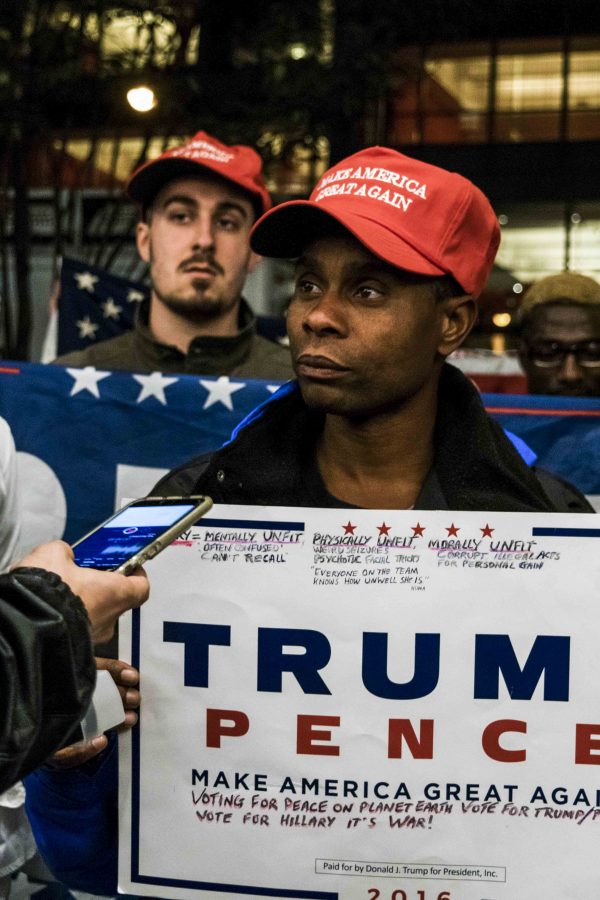Why Couldn’t We Handle Four Years of This?
A Trump supporter outside of the Hilton in New York on Election Night.
The impossible is real and, frankly, Democrats are disoriented in trying to figure out how.
For all the incessant talk of classified information that drove 2016’s political circus, for all the vitriolic discussion surrounding Clinton’s emails and Trump’s rhetoric, for all the data-driven campaigning designed to secure an inside path for Clinton to the presidency — it was maybe the least classified information of all that hindered Hillary Clinton’s chance of becoming the first woman president of the United States: her intention to continue down the road President Barack Obama, and the rest of Washington, has taken America.
As a former member of Obama’s cabinet, Secretary Clinton made no effort to veil the fact that Obama’s time in office was going to be her leaping-off point. It was this that drew ire from Republicans — a “we can’t handle four more years of Obama” groupthink that peppered political commentary for the last year and drove millions of Republicans to the polls who did not turn out for Mitt Romney in 2012.
“The validity in [the worry surrounding four more years of Obama] is that a lot of her plans follow suit of exactly what Obama wanted to do,” Gallatin senior Alicia Lang, who identifies herself as a Libertarian believing in small government, said. “She has no intention of repealing Obamacare. Her tax plans are very similar to Obama’s, where supposedly the goal is to strengthen the middle class and create a level playing field.”
She, and many center- or right-leaning conservatives at NYU, criticized the optimism demarcating Obama’s time in office — an optimism Clinton had hoped would continue — as little more than wishful thinking that would have struggled to materialize without a dramatic increase in taxes and government size.
Now, we are left with Trump — the unknown.
But these are the most trite of Republican vs. Democrat arguments — squabbles over the size of government and tax rates. All this is to say nothing of the loss of trust in government, which proved to be a key strategy in the Trump campaign’s shaping of its candidate as the ideal disruptor for disaffected white voters. According to Gallup polls, those who answered “None at all” to the question of “How much trust do you have in our Federal Government in Washington?” is at a three-year peak, not seen since 2005 through 2008 — the latter days of the Iraq War and the height of the Chelsea Manning WikiLeaks.
This soured the taste in the mouths of undecided voters who had become more and more skeptical of corruption in government. CAS junior Louis Bartholomew, the former Treasurer of the NYU College Republicans and the current Treasurer of the NYU Politics Society, pointed to this as a key reason he’s noticed for the steadfast disdain for Clinton that barred her from the Oval Office.
“I think the main reason that people hate her — I think partially there’s a little sexism in there, although I think there’s less sexism than people would like to believe, but I think it is there,” Bartholomew said. “I think the overriding thing is that she’s just viewed as corrupt.”
Bartholomew’s painting of Clinton offers some explanation as to why Clinton polled poorly among states in the midwest who have, by the indication of yesterday’s exit polls, become fed up with the repercussions of American trade failures. Emails drudged up memories of scandals and policies that have been dispersed through Clinton’s — as well as her husband’s — political careers, giving voters an easier path away from the Washington establishment.
“The email scandal just dealt a huge blow and brought forth a lot of corruption ideas from the past,” Bartholomew said. “Whether that be lying about the Bosnian sniper fire incident, whether that be her changes in stances on gay marriage — there’s just this whole narrative that’s been created around her being this flip-flopper and just being a corrupt politician.”
All things considered, however, Bartholomew, Lang and other moderately conservative voters at NYU expressed an actual affinity for some of Clinton’s policies that the rest of the country obviously did not. Bartholomew even went as far as saying that “if the Republicans didn’t hate her so much, they’d love to work with her.”
Perhaps the most shocking reverse of narrative was the sentiment that Democrats would turn out to keep Trump out of the presidency. President of the NYU College Democrats Michael DeLuca said, days before the election, that though the College Democrats were rallying around their candidate via phone calls and canvassing, they could not ignore the inherent fear they had of the opposing one.
“These past few months have been characterized not only by a desire to get Hillary Clinton into the White House, but a desire to keep Trump out,” DeLuca said. “This is an election for specific people, but also a referendum on the issues we care about.”
This referendum could see its peak in the coming months, even on issues that are core to the American identity for many voters. For DeLuca, this starts and ends with personal freedom.
“Our big principles of things like freedom of speech, freedom of the press [are under attack],” DeLuca said. “Trump has threatened to loosen our libel laws so that he can go after the media that has criticized him. When you think about the immediate effect that his presidency could have on those basic principles that we all believe in, it’s a scary thought.”
A version of this article appeared in the WSN 2016 Election Issue. Email Bobby Wagner at [email protected].

Bobby Wagner is the Managing Editor for the Washington Square News. He's from Philly, much like his icon, Meek Mill. You can catch him yelling abhorrent...























































































































































